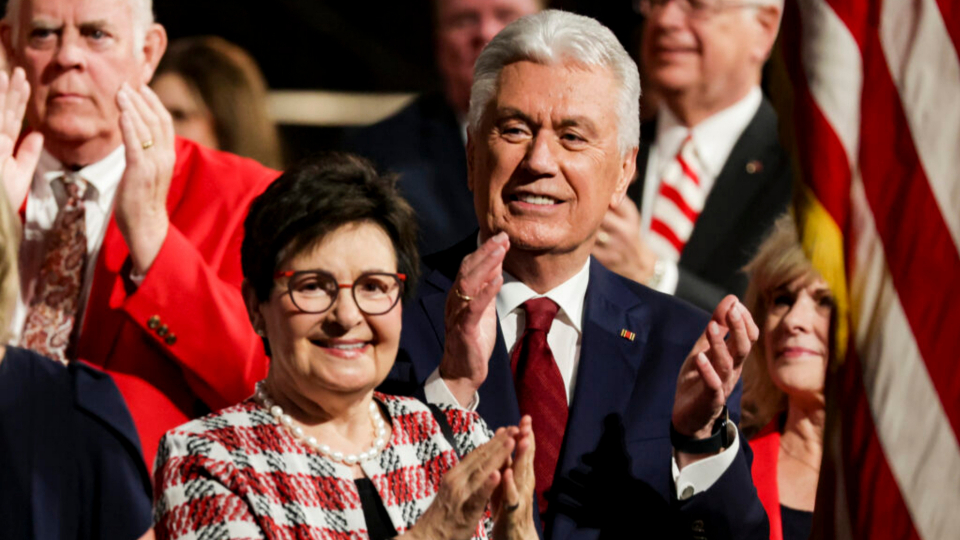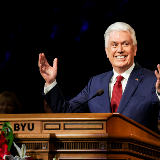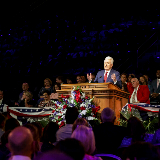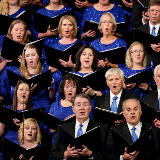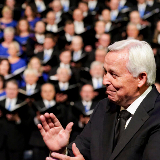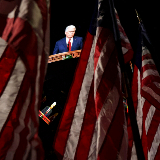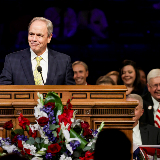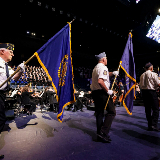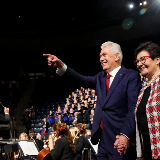Having the ultimate citizenship will change hearts, heal divisions and bring peace, taught Elder Dieter F. Uchtdorf of the Quorum of the Twelve Apostles on the eve of Independence Day in the United States.f
“Citizenship in the kingdom of Almighty God is open to all. It makes all of us better citizens in our own nation. It makes us better neighbors and friends, locally and globally. It fosters peace, understanding, cooperation and prosperity,” he said.
Speaking at the Sunday evening, July 3, Patriotic Service at the Marriott Center, Elder Uchtdorf spoke of his hope for humanity: “It is my prayer today, that this Fourth of July, our Independence Day, we will declare our independence from the division and bitterness of our day, that we trust in God and embrace the independent light of the gospel of Jesus Christ.”
The event featured the American Festival Chorus and Orchestra, conducted by Craig Jessop. Elder Uchtdorf was accompanied by his wife, Sister Harriett R. Uchtdorf. Elder Michael T. Ringwood, General Authority Seventy, and his wife, Sister Rosalie Ringwood, were also in attendance, along with local and state civic and political leaders.
Elder Uchtdorf told the crowd he was deeply honored to speak to them. He was born in what is now the Czech Republic in the middle of World War II. As a child, he played in the bomb craters and destroyed buildings of Zwickau, Germany.
His family fled violence and were refugees themselves, and so when Elder and Sister Harriet Uchtdorf visited Eastern Europe a few months ago, and met with people who are suffering the effects of armed conflict again, Elder Uchtdorf said he saw himself in their eyes.
“I understand, to a degree, the fear, desperation and uncertainty those displaced families feel. It was a feeling that connected with a deep ache inside me. Their sorrow felt fresh, immediate and personal,” Elder Uchtdorf said.
But along with the fear, he saw something else: resilience, faith in a higher power, great strength of character — and hope.
“I will tell you today what I told them: Our beloved Heavenly Father holds the nations of the world in His hands,” said Elder Uchtdorf. “No earthly threat is beyond His power to overcome. No outcome takes Him by surprise. He has foreseen all.”
And so, despite threats to peace and freedom throughout the world, Elder Uchtdorf has hope.
| Elder Dieter F. Uchtdorf of the Quorum of the Twelve Apostles claps during the Patriotic Service of America’s Freedom Festival in the Marriott Center in Provo on Sunday, July 3, 2022. | 1 / 10 |
Citizenship in God’s Kingdom Changes Hearts
Elder Uchtdorf said the adversary takes a human tendency to be suspicious of those who think differently — in sports, politics, religion, cultures, neighborhoods and even in families — and then escalates that divide.
People can choose to reject the lies and embrace a better way: “We can escape the endless cycle of hatred and create a new one of trust, understanding and cooperation.”
“I hold three citizenships,” Elder Uchtdorf said. “I am a citizen of of the United States of America. I am also a citizen of Germany. And I hold a third cherished citizenship. I am a citizen in the kingdom of God.”
Citizenship in the kingdom of God is not based on birthplace or language or money — it’s not about who you are but rather who you are willing to become.”
Mosiah 18 outlines what one must do to be granted citizenship in the Kingdom of God:
- Hear, believe and act upon the word of God.
- Repent and exercise faith in the Lord.
- Set aside selfish interests and, instead, bear one another’s burdens, mourn with those who mourn and comfort those who need comfort.
- Be baptized and walk with holiness of heart.
“Can you imagine what the world would be like if everyone, regardless of our citizenship in the kingdoms of the world, embraced these principles of God’s kingdom?” asked Elder Uchtdorf. “What if humility, compassion and holiness replaced stubbornness, greed and corruption? Our hearts could finally be ‘knit together in unity and love one towards another.’”
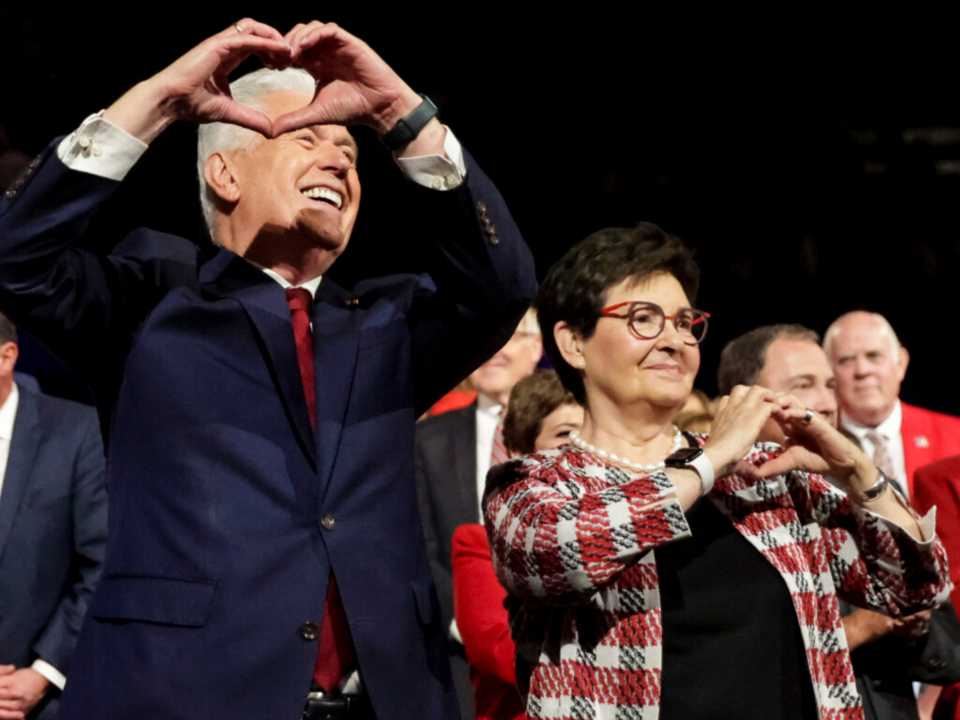 Download Photo
Download Photo
The Power of Virtue
In addition, Elder Uchtdorf taught about the importance and power of virtue.
“In this country, we are blessed to have an inspired Constitution that lays out an exemplary form of government. But without personal virtue, it isn’t enough,” he said.
He quoted Samuel Adams, one of America’s Founding Fathers, who wrote: “Neither the wisest constitution nor the wisest laws will secure the liberty and happiness of a people whose manners are universally corrupt.”
King Mosiah in Mosiah 29 outlined the differences between righteous rulers and wicked kings. Benjamin Franklin said: “Only a virtuous people are capable of freedom. As nations become corrupt and vicious, they have more need of masters.”
Elder Uchtdorf asked, “So what will our future look like? Will we become a nation in need of more masters? Or will we rise as sons and daughters of a loving God and strive for goodness? Compassion for others? Justice, humility, civic courage, kindness and charity toward all?”
Choose Something Better
Elder Uchtdorf said that while there is hatred and suffering and division all around, and while humankind has made terrible mistakes in the past, “we are not doomed to repeat them. There is a way out. God has placed within each of us the power to choose something better.”
As people strive for goodness and seek to fill their hearts with love for God and for others, hatred and cruel intentions dissolve — they become transformed from the inside out.
“And while we cannot control what others may do, we can choose for ourselves. We can reject selfishness, greed and pride. We can set aside hatred and turn our hearts toward our brothers and sisters. We can accept our higher purpose — to bear each other’s burdens. By doing so, we truly fulfill the law of Christ.
“This is the highest hope for humanity.”
